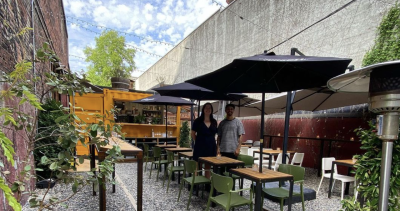Know your local filmmaker: Asia Youngman
Most Vancouverites will remember where they were when the riot broke out. It was 2011, and the Canucks had just lost Game 7of the Stanley Cup Finals—on home ice, no less.
The riot is certainly well documented (and remembered), but a new film from Cree-Métis director Asia Youngman explores the lesser-known aftermath experienced by those involved on that ugly day. I’m Just Here for the Riot uses on-the-ground footage and exclusive interviews with rioters to dissect the social and mental violence that reverberated long after downtown was cleaned up. The documentary, which Youngman directed with Kathleen Jayme, will have its Vancouver premiere at the Vancouver International Film Festival kicking off at the end of September.
What do you do?
I am a screenwriter and director based in Vancouver. I work in a variety of spaces, including film and television—which means documentary as well
as fiction.
What drew you to a career in film and TV?
When I was younger, I was always really interested in films. I spent a lot of time watching television, and watching different films, and I just really love the idea of storytelling.
What kinds of stories do you gravitate towards?
I do gravitate towards a lot of stories about Indigenous youth and Indigenous women and women in general, because I feel like there are a lot of portrayals of women, and especially Indigenous women, that I’d love to see on film and in television. But at the same time, there’s stories like the 2011 Stanley Cup hockey riots, which is quite different from the previous types of films that I’ve made. The stories that I feel like haven’t been told are the ones that I get really excited about.
That’s always the exciting thing about us as filmmakers: we can offer so many different perspectives on the story. I’m excited to tell stories that haven’t been told, and maybe that people are a little bit apprehensive about telling, as well.
When making the riot documentary, did you go into it knowing what you wanted to say, or was that discovered through the process?
When we were pitching the film, we always wanted to explore this tale of two riots. I think people will think that it’s the riot from 2011, and also the riot from 1994. And in some ways it is, but it’s also the online riot. I think that’s what was so interesting for us with this film: it’s this unexplored riot that hasn’t really been talked about. So for us, we always really wanted to dig deep into the social media aspect, the public shaming aspect, the social surveillance aspect. We just felt like throughout all the media coverage that the riot got, this was the side that didn’t get explored as thoroughly.
It’s also still so relevant today with the amount of outrage we continue to see on social media channels.
This was such an early example of cancel culture. Just to see how things have changed over the past 12 years, it’s quite alarming. I think it’s something that we’re almost used to now, which is concerning. Seeing how things have changed over this amount of time, I can’t imagine how things are going to be in the next 10 to 12.
What do you hope people take away from the film?
I hope people will put themselves in the place of: what would they do if they were in that situation? Let’s say there was another riot to happen in Vancouver because of the loss of a Game 7 Stanley Cup Final. Would people stand up for their fellow citizens? Would they be taking pictures of people? How would they interact with social media? How would they respond to people who maybe made a mistake? I think ultimately, we hope people will learn from this and that it won’t happen again. But the sad thing is: history repeats itself. We see other examples of events like this that happen on a day-to-day basis now, and how people are shaming others online without really knowing the backstory, or maybe just not having as much empathy as we used to have. So we hope people will take something away from it and maybe question how they interact with their own social media platforms moving forward.















Comments